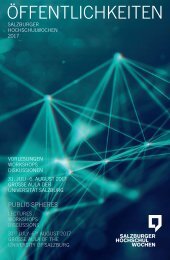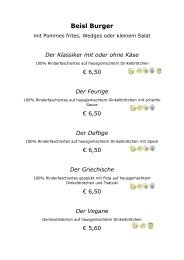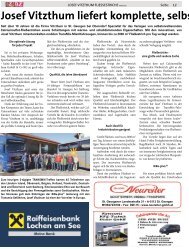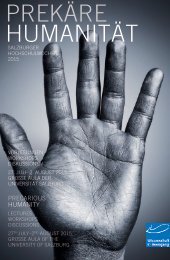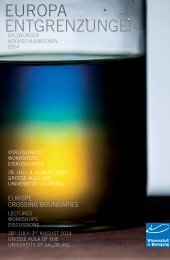Salzburger Hochschulwochen 2016
Programm der Salzburger Hochschulwochen 2016, zum Thema Leidenschaften. Vorlesungen, Workshops und Diskussionen vom 1.-7.August 2016
Programm der Salzburger Hochschulwochen 2016, zum Thema Leidenschaften. Vorlesungen, Workshops und Diskussionen vom 1.-7.August 2016
Sie wollen auch ein ePaper? Erhöhen Sie die Reichweite Ihrer Titel.
YUMPU macht aus Druck-PDFs automatisch weboptimierte ePaper, die Google liebt.
themen<br />
topics<br />
univ.-prof. dr.<br />
andreas zick<br />
bielefeld<br />
Geb. 1962 im Ruhrgebiet. 1982 bis 1990 Studium der<br />
Psychologie und der Ev. Theologie in Essen und an der<br />
Ruhr-Universität Bochum. 1996 Promotion an der Fakultät<br />
für Psychologie der Phillips-Universität Marburg, 2008<br />
Habilitation und Venia Legendi für das Fach Psychologie<br />
an der Martin-Luther-Universität Halle-Wittenberg. Vertretungsprofessuren<br />
an den Universitäten Dresden und Jena.<br />
Seit 2008 Professor für Sozialisation und Konfliktforschung<br />
an der Universität Bielefeld. Seit 2013 Direktor des Instituts<br />
für Interdisziplinäre Konflikt- und Gewaltforschung an<br />
der Universität Bielefeld.<br />
zick.ikg@uni-bielefeld.de<br />
05<br />
06<br />
Vorlesung<br />
5. und 6. August<br />
Große Aula<br />
Diskussion<br />
6. August, HS 101<br />
Zwischen Willkommenskultur<br />
und menschenfeindlicher Ablehnung<br />
Europa ist gespalten und an manchen Stellen zerrissen.<br />
Zugleich sind viele europäische Länder innergesellschaftlich<br />
zerrissen. Mit dem Blick auf die Frage der Integration<br />
von asylsuchenden und geflüchteten Menschen ist<br />
unübersehbar, wie stark die Risse in den Gesellschaften<br />
sind. In Deutschland hat die Zahl der Angriffe auf<br />
Flüchtlingsunterkünfte ein extremes Ausmaß angenommen.<br />
Seit dem Jahr 2002 untersucht das Institut für<br />
Interdisziplinäre Konflikt- und Gewaltforschung die<br />
Ursachen, Facetten und Konsequenzen menschenfeindlicher<br />
Meinungen in Deutschland. Der Vortrag erstattet<br />
Bericht über die Entwicklungen von Vorurteilen, wie aber<br />
auch Faktoren, die ihnen entgegenstehen. Dabei soll am<br />
Ende weniger eine Antwort auf die Frage, ob „wir das<br />
schaffen“ als vielmehr „wie die Bürger“ das schaffen,<br />
gesucht werden.<br />
Born in 1962 in the Ruhr district. From 1982 – 1990<br />
studied Psychology at the Institute of Evangelic Theology<br />
at Essen University and at the Ruhr University, Bochum.<br />
Awarded a Ph.D. by the Faculty of Psychology at the Phillips<br />
University, Marburg. In 2008 Habilitation and Venia<br />
Legendi for Psycholgy at the Martin Luther University in<br />
Halle-Wittenberg. Deputy professorships at the Universities<br />
of Dresden and Jena. Since 2008 professor for Socialisation<br />
and Conflict Studies at the University of Bielefield. Since<br />
2013 Director of the Institute for Interdisciplinary Conflict<br />
and Violence Research at the University of Bielefield.<br />
zick.igk@uni-bielefeld.de<br />
05<br />
06<br />
Lecture<br />
5 th and 6 th August<br />
Große Aula<br />
Discussion<br />
6 th August, HS 101<br />
Between a Culture of Welcome<br />
and Misanthropic Rejection<br />
Europe is divided and in many places torn apart. At the<br />
same time the societies of many European countries are<br />
themselves torn apart. Consideration of the question of<br />
the integration of asylum-seekers and refugees makes<br />
very clear just how powerful these rifts in our societies<br />
are. In Germany the number of attacks on refugee<br />
shelters has assumed extreme proportions. Since 2002<br />
the Institute for Interdisciplinary Conflict and Violence<br />
Research has been studying the causes, facets and<br />
consequences of homophobic opinions in Germany. In<br />
this lecture I will report on prejudices as well as on those<br />
factors which are in opposition to them. The ultimate<br />
intention is to provide not so much an answer to the<br />
question as to ‘whether can do it’, but rather ‘how the<br />
citizens’ can do it.




